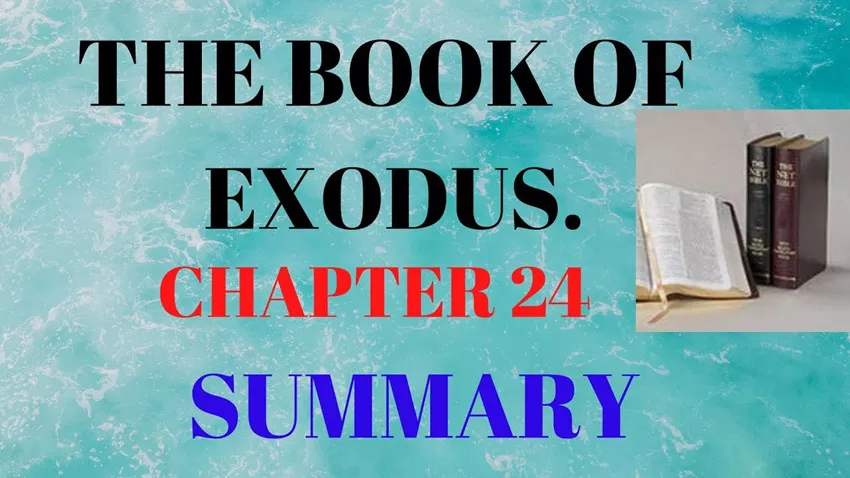Exodus Chapter 24 Summary
Exodus 24 records the formal ratification of the covenant between God and Israel. Moses, along with Aaron, his sons, and seventy elders, ascends Mount Sinai where they are called to worship God. Moses reads aloud the Book of the Covenant, and the people unanimously agree to obey all that God has commanded. Moses then sprinkles the blood of sacrificed animals on the altar and the people, symbolizing the sealing of the covenant. Afterward, Moses, Aaron, and the elders ascend further on the mountain, where they experience a divine vision of God’s glory. Moses remains on the mountain for forty days and nights, preparing to receive further instructions from God. This chapter underscores the solemnity of Israel’s commitment to God’s law and the sacred nature of the covenant.
Bible Exodus Chapter 24
Welcome to read Exodus Chapter 24. Here is the list of Exodus Chapter 24:
What Does Exodus Chapter 24 Teach Us?
Exodus chapter 24 marks a significant moment in Israel’s journey with God, as it records the covenant between God and His people, sealed with sacrifices and a communal commitment to obedience. This chapter reveals important lessons about God’s holiness, the role of leadership, and the need for both reverence and commitment in our relationship with Him. Here are key lessons we can learn from this chapter:
1. The Importance of Covenant Commitment
Exodus 24 begins with God calling Moses, Aaron, and the elders of Israel to the mountain to make a covenant with Him (Exodus 24:1-3). Moses reads the Book of the Covenant, and the people affirm their commitment to obey all that God has commanded. The chapter emphasizes the significance of covenant relationships—God’s promises to His people and their commitment to obey His commands. This teaches us that our relationship with God is based on a mutual commitment: God promises to bless and guide us, and in return, we are called to live in obedience to His Word.
2. The Role of Sacrifice in Sealing the Covenant
To formally seal the covenant, Moses builds an altar, sacrifices offerings, and sprinkles the blood of the animals on the people and the altar (Exodus 24:4-8). The blood symbolizes the sealing of the covenant, a common practice in ancient covenants. This teaches us the seriousness and sanctity of our relationship with God. Blood sacrifice was necessary for atonement, pointing forward to the ultimate sacrifice of Jesus Christ, whose blood would seal a new covenant between God and His people (Luke 22:20). The concept of sacrifice reminds us of the cost of redemption and the importance of holiness in our relationship with God.
3. The Holiness of God and the Need for Reverence
When Moses, Aaron, Nadab, Abihu, and seventy elders ascend the mountain, they have a unique encounter with God, seeing a vision of His glory (Exodus 24:9-11). They eat and drink in His presence, but they do not die, which emphasizes God’s grace and mercy. However, this encounter also shows the holiness of God and the reverence due to Him. God’s presence is not to be taken lightly, and the leaders are reminded of the profound nature of their relationship with a holy God. This teaches us to approach God with awe, reverence, and humility, recognizing His greatness and holiness.
4. The Role of Leadership and Obedience
Moses is called to go up the mountain to receive the tablets of stone (Exodus 24:12-18). He is entrusted with the responsibility of leading the people and receiving God’s further instructions. The leaders of Israel, including the seventy elders, play a significant role in representing the people before God. This shows us the importance of leadership in guiding others in their relationship with God. It also emphasizes that those in positions of leadership must be obedient to God’s Word and maintain integrity in their actions. Leaders are called to set an example and help others grow in their faith.
5. God’s Faithfulness in His Promises
Finally, God’s promise to Moses and the Israelites is reaffirmed in this chapter. Despite the challenges ahead, God remains faithful to His covenant and will lead His people into the Promised Land. Moses spends forty days and nights on the mountain, receiving detailed instructions from God (Exodus 24:18). The duration of his stay signifies the importance of God’s laws and the seriousness of His covenant. This teaches us that God is faithful to His promises, even when it takes time for His plans to unfold. We are called to trust in God’s timing and His commitment to fulfill His promises to us.
Related topics:


